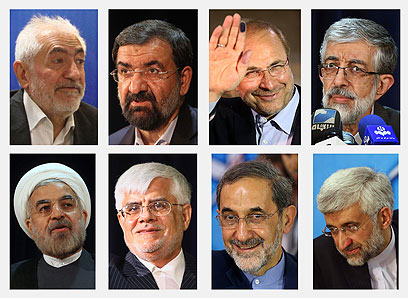Kerry says US will not accept nukes in Iran's hands
US State Secretary has no expectations Iranian presidential elections will change its nuke program, warns patience waning; 'Every month that goes by gets more dangerous,' he cautions
News Agencies
|
US Secretary of State John Kerry said on Friday he did not have high expectations that an upcoming presidential election in Iranwould change the calculus over Tehran's nuclear program, repeating it was unacceptable for Iran to have a nuclear weapon.
At a joint news conference with German Foreign Minister Guido Westerwelle, Kerry said Iran needs to understand that international patience was waning over the nuclear program that Tehran says is meant for peaceful purposes.
Related stories:
- US: Iran's sponsorship of terrorism sees 'marked resurgence'
- Argentine prosecutor: Iran infiltrating continent
- Iran's presidential candidates clash over nuclear approach
"Every month that goes by gets more dangerous," Kerry said.
According to an International Atomic Energy Agency report, Iran has increased its capacity to refine uranium by installing hundreds of more centrifuges at its Natanz plant, underlining Tehran's defiance of Western demands to curb the activity.
But, in a development that could help buy time for diplomacy between Iran and world powers, the report also showed limited growth of Iran's most sensitive nuclear stockpile and it remained below an Israeli "red line" for possible action.

Iran's eight presidential candidates (Photo: AP)
In Friday's press conference, Kerry also referred to the Russian-Syrian arms deal, and warned Russia that arming PresidentBashar Assad's forces would hurt efforts to bring Syria's warring parties together for peace talks.
Kerry added that Russian plans to send a sophisticated air defense system to Assad also put Israel's security at risk.
The United States and Russia are pressing for a peace conference in Geneva next month between Syria's
government and opposition. Westerwelle called on Assad to "stop the violence and come to the negotiating table" and told Russia that sending the S-300 missiles to Assad "is totally wrong."
Iran's economy has been ailing in part because of international sanctions, and though few directly referred to them, the sanctions heavily hinted at in the first of three televised debates between the eight presidential candidates in the approaching elections.
In Friday's debate, hard-liner Ali Akbar Velayati, a top adviser to the supreme leader, said Iran cannot use its full capacities without improving ties with the world and neighboring countries.
Mohsen Rezaei, a former Revolutionary Guard commander, said, "We should find a logical solution for the sanctions" to deal with inflation.
One of the more prominent candidates is Saeed Jalili, head of Iran's negotiations team on the nuclear subject.
Reuters, AP contributed to this report